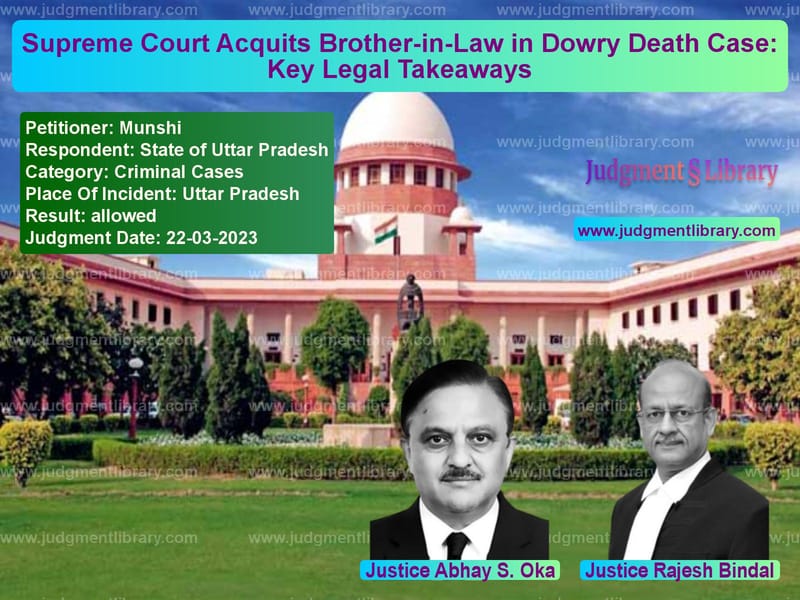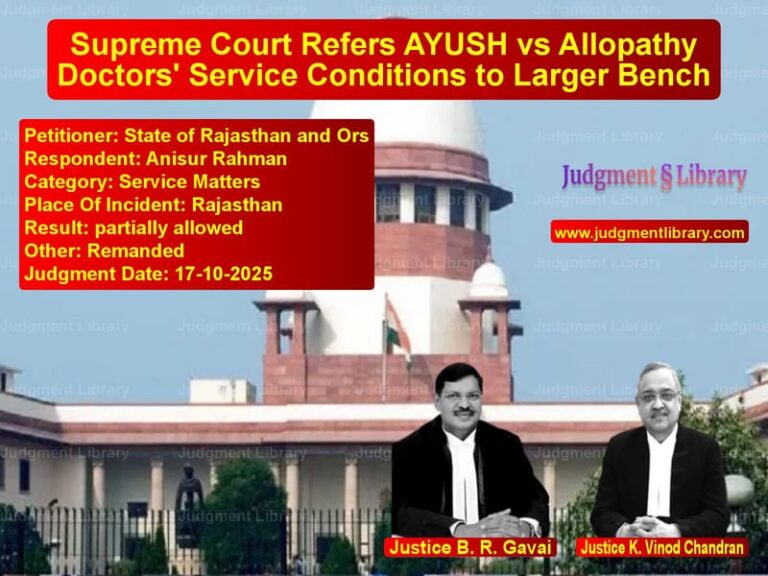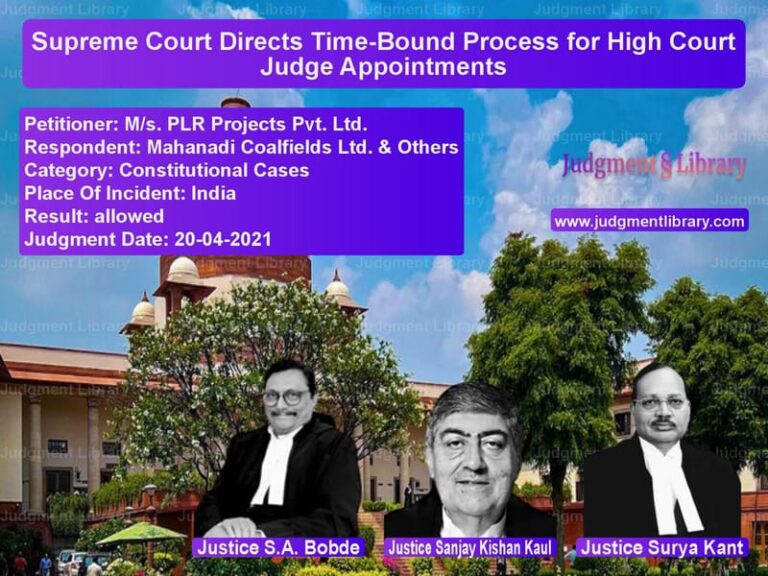Supreme Court Acquits Brother-in-Law in Dowry Death Case: Key Legal Takeaways
The Supreme Court of India recently delivered a crucial judgment in the case of Munshi v. State of Uttar Pradesh, concerning allegations of dowry death and cruelty under the Indian Penal Code (IPC) and the Dowry Prohibition Act. This case highlights the importance of evidence in criminal trials, particularly in dowry death cases where conviction often relies on circumstantial evidence and legal presumptions.
The appeal was filed by Munshi, the brother-in-law of the deceased, who was convicted under Sections 304B and 498A of the IPC and Section 4 of the Dowry Prohibition Act. The Supreme Court ultimately overturned his conviction, ruling that there was insufficient evidence to establish his role in the crime beyond reasonable doubt.
Background of the Case
The case originated from an FIR registered as Crime Case No. 30 of 1993, following the death of Janki Devi, who was married to Kamlesh Singh. The complaint was lodged by Chander Singh (PW-1), the brother of the deceased. He alleged that Janki Devi had been subjected to harassment and torture for dowry, including demands for a buffalo and a vehicle (Vicky). According to the prosecution, these demands were not met, leading to her death by poisoning on 28.02.1993.
The trial court convicted Kamlesh Singh (husband), Vishwaraj Singh (brother-in-law), and Munshi (another brother-in-law) under Sections 304B and 498A of the IPC and Section 4 of the Dowry Prohibition Act. They were sentenced to:
- 10 years of rigorous imprisonment under Section 304B IPC.
- 2 years under Section 498A IPC.
- 2 years under Section 4 of the Dowry Prohibition Act.
On appeal, the High Court of Allahabad upheld their conviction. However, when the matter reached the Supreme Court, the Court issued notice only regarding Munshi, dismissing the appeal for the other two convicts.
Arguments of the Parties
Petitioner’s Arguments (Munshi)
- The appellant (Munshi) argued that there were no specific allegations against him regarding the demand for dowry or harassment.
- He contended that the prosecution relied on general accusations, which were insufficient to invoke the presumption under Section 113B of the Indian Evidence Act, 1872.
- It was argued that there was no evidence of cruelty or harassment soon before the death of the deceased, as required under Section 304B IPC.
- Munshi maintained that he had no personal interest in the alleged dowry demands (a buffalo and a vehicle), making his involvement highly improbable.
Respondent’s Arguments (State of Uttar Pradesh)
- The prosecution asserted that the case was one of dowry death and that the appellant was part of the in-laws’ household where the harassment occurred.
- They pointed out that the complaint and witness statements consistently alleged torture and threats over unmet dowry demands.
- The prosecution argued that since the husband and another brother-in-law had already been convicted, the appellant should also face the same legal consequences.
Key Observations of the Supreme Court
The Supreme Court analyzed the circumstantial evidence and reviewed the principles governing dowry death cases, particularly the legal presumption under Section 113B of the Indian Evidence Act. The key observations made by the Court were:
- Presumption under Section 113B of the Evidence Act: The Court emphasized that for the presumption to apply, the prosecution must establish that cruelty or harassment occurred “soon before the death.” In this case, the evidence was general and did not specifically implicate Munshi.
- Lack of Direct Allegations: The Court noted that none of the prosecution witnesses provided specific allegations against Munshi. The statements were broad and did not establish his direct involvement in the alleged harassment.
- Role of the Accused: The Court found that the appellant, as the brother-in-law of the deceased, had no apparent motive or financial interest in the dowry demands. The alleged demands for a buffalo and a vehicle were made by other family members.
- Insufficient Evidence: The prosecution relied solely on circumstantial evidence, which the Court found inadequate to convict Munshi beyond reasonable doubt.
Final Ruling
The Supreme Court set aside Munshi’s conviction, stating:
- There was no clear evidence linking Munshi to acts of cruelty or harassment soon before the deceased’s death.
- The general allegations made against him did not meet the standard required to establish guilt under Section 304B IPC.
- Presumptions under the Evidence Act cannot replace proof beyond reasonable doubt.
Accordingly, the Supreme Court allowed Munshi’s appeal and acquitted him, canceling his bail bonds.
Implications of the Judgment
This ruling has several critical implications for dowry death cases:
- Role of Evidence: The case underscores that courts cannot convict individuals based on vague or general allegations. Specific evidence is required to establish guilt.
- Presumption Under Section 113B: While Section 113B allows for a presumption of guilt in dowry death cases, this presumption is not automatic and must be supported by clear evidence.
- Protection of Innocent Relatives: The judgment highlights that merely being a relative of the husband does not make a person automatically culpable. The prosecution must prove active participation in harassment.
Conclusion
The Supreme Court’s decision in Munshi v. State of Uttar Pradesh sets an important precedent in dowry death cases by reaffirming the principle that legal presumptions must be supported by clear and specific evidence. By acquitting Munshi, the Court has clarified that merely being part of a household where dowry harassment occurs is not enough for conviction.
This judgment serves as a reminder that criminal liability must be established beyond reasonable doubt, ensuring that innocent individuals are not punished based on presumptions or general accusations.
Petitioner Name: Munshi.Respondent Name: State of Uttar Pradesh.Judgment By: Justice Abhay S. Oka, Justice Rajesh Bindal.Place Of Incident: Uttar Pradesh.Judgment Date: 22-03-2023.
Don’t miss out on the full details! Download the complete judgment in PDF format below and gain valuable insights instantly!
Download Judgment: munshi-vs-state-of-uttar-prade-supreme-court-of-india-judgment-dated-22-03-2023.pdf
Directly Download Judgment: Directly download this Judgment
See all petitions in Dowry Cases
See all petitions in Alimony and Maintenance
See all petitions in Domestic Violence
See all petitions in Judgment by Abhay S. Oka
See all petitions in Judgment by Rajesh Bindal
See all petitions in allowed
See all petitions in supreme court of India judgments March 2023
See all petitions in 2023 judgments
See all posts in Criminal Cases Category
See all allowed petitions in Criminal Cases Category
See all Dismissed petitions in Criminal Cases Category
See all partially allowed petitions in Criminal Cases Category







